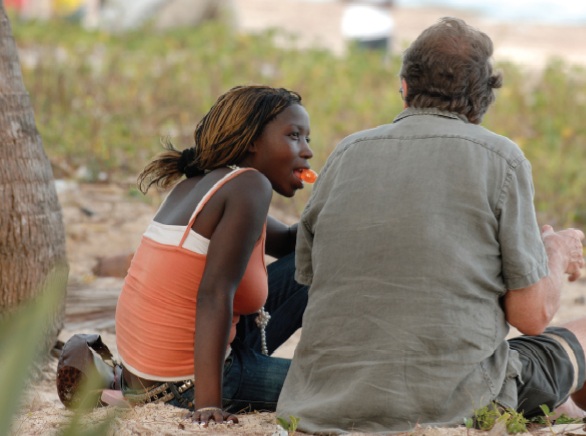
The world’s oldest
profession is changing
and finding strange new
bedfellows along the
Kenyan Coast
(Josaya Wasonga) – Tonight is not my night. The clubs are empty. I guess it’s because it’s a Thursday. I’m headed to a local joint that is a favourite amongst Diani residents. My guide, Ali, swears that Beach Road, Ukunda is a tourism hot spot because it’s chock-ablock with lodges, boutiques, cottages, nightspots… you name it – from chic to downright cheap and nasty, all meant to be tourist magnets.
I’m club-hopping, hoping for some action… ladies-of-the-night kind of action, to be precise. I’ve been reliably informed that the evening’s proceedings usually kick off just after 9PM when the disco at this airy venue gets going. Then matters move onto Shakatak, also on Beach Road. We passed it earlier, but it was still quiet. We also passed Tandoori, a makuti-style tavern and another hot spot. It was blaring African music and several scantily clad women were perched on bar stools. Ali confirmed my suspicions that they’re prostitutes, gearing up for their night’s work.
When we arrive, the disco is deserted, save for five or so ladies seated in different places nursing soft drinks and sizing us up as I order a Coke and settle into a worn-out makuti seat. I look out over the windswept beach as the moon peers out from behind a swirl of clouds.
In the Zone
The fact that there are only small numbers of women in this establishment is deceptive.
According to a recent survey by Solidarity with Women in Distress (SOLWODI) – a nongovernmental organisation that supports commercial sex workers and girls who are at risk, in the coastal towns of Mombasa, Kwale, Kilifi and Malindi – there are an estimated 4161 sex workers in Msambweni district, which is where Ukunda is located; 5.9% of females of child-bearing age (15-49 years of age).
SOLWODI has broken down the area into four zones: Zone 1 stretches from Tiwi Bridge to Corner ya Beach, upper side, and their attention is focussed on a place called Meat Zone. Zone 2 stretches from Tiwi Bridge to Corner ya Beach, lower side, and the places on this stretch are African Pot and Ushagoo. Zone 3 stretches from Beach Corner to Mvindeni, upper side, and here the ones on their radar are Masai, Starehe and Juhudi. Zone 4 stretches from Beach Corner to Mvindeni, lower side, where establishments such as tandoori, Shakatak, Manyatta, Kings Club, Willow, Rongai Weekend Pavilion and Famous are to be found.
The Digo are the original inhabitants of this area, but successive migrant communities and locals – people who have come to work in the hospitality industry and sex workers from upcountry among them – have turned this once sleepy town on the road to the Lunga Lunga border post, into a bustling pit stop for buyers and sellers of everything from flesh, to fresh ocean air.
Continued on next page

